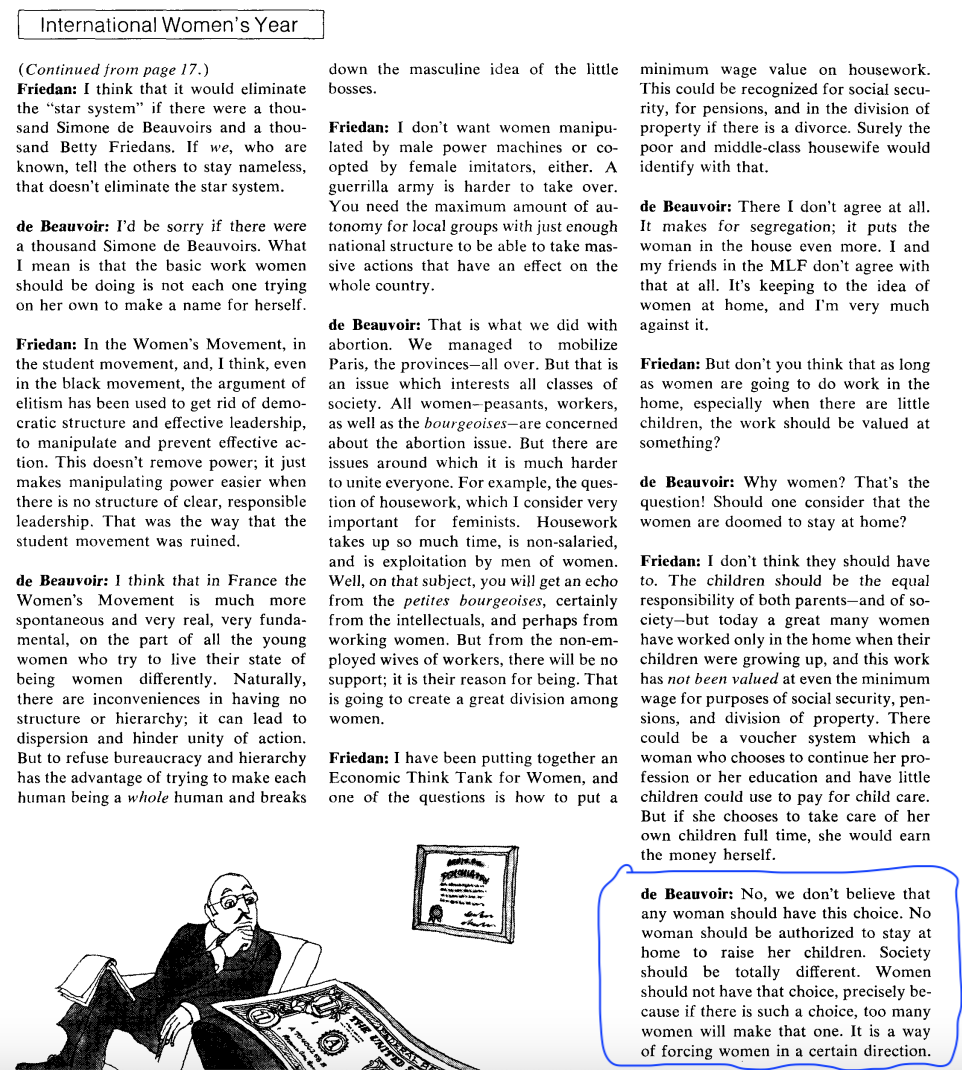Simone Lucie Ernestine Marie Bertrand de Beauvoir

Simone Lucie Ernestine Marie Bertrand de Beauvoir (9 January 1908 – 14 April 1986) was a French existentialist philosopher, writer, social theorist, and feminist activist. Though she did not consider herself a philosopher, nor was she considered one at the time of her death, she had a significant influence on both feminist existentialism and feminist theory.
Beauvoir wrote novels, essays, biographies, autobiographies, and monographs on philosophy, politics, and social issues. She was best known for her "trailblazing work in feminist philosophy", The Second Sex (1949), a detailed analysis of women's oppression and a foundational tract of contemporary feminism. She was also known for her novels, the most famous of which were She Came to Stay (1943) and The Mandarins (1954). Her most enduring contribution to literature is her memoirs, notably the first volume, Mémoires d'une jeune fille rangée (1958), which has warmth and descriptive power. She was also a highly awarded woman, some of the most notable prizes being the 1954 Prix Goncourt, the 1975 Jerusalem Prize, and the 1978 Austrian State Prize for European Literature. Her life was not without controversy: she briefly lost her teaching job after being accused of sexually abusing some of her students.
She and her long-time lover, Jean-Paul Sartre, along with numerous other French intellectuals, campaigned for the release of people convicted of child sex offenses and signed a petition which advocated the abolition of age of consent laws in France.[1][2]
Allegations of Sexual Abuse
Beauvoir was bisexual, and her relationships with young women were controversial. French author Bianca Lamblin (originally Bianca Bienenfeld) wrote in her book Mémoires d'une jeune fille dérangée (Memoirs of a deranged girl, published in English under the title A Disgraceful Affair) that, while a student at Lycée Molière, she was sexually exploited by her teacher Beauvoir, who was in her 30s. Sartre and Beauvoir both groomed and sexually abused Lamblin. Bianca wrote her Mémoires in response to the posthumous 1990 publication of Jean-Paul Sartre's Lettres au Castor et à quelques autres: 1926-1963 (Letters to Castor and other friends), in which she noted that she was referred to by the pseudonym Louise Védrine.
In 1943, Beauvoir was suspended again from her teaching position when she was accused of seducing her 17-year-old lycée pupil Natalie Sorokine in 1939. Sorokine's parents laid formal charges against Beauvoir for debauching a minor (the age of consent in France at the time was 13 until 1945, when it became 15) and Beauvoir's licence to teach in France was revoked, although it was subsequently reinstated.
Student Olga Kosakiewicz also accused de Beauvoir of seducing her.
Beauvoir described in La Force de l'âge (The Prime of Life) a relationship of simple friendship with Nathalie Sorokine (in the book referred to as "Lise Oblanoff").
Natalie Sorokine, along with Bianca Lamblin and Olga Kosakiewicz, later stated that their relationships with de Beauvoir damaged them psychologically.
Quotes

"One is not born, but rather becomes, a woman. No biological, psychological or economic fate determines the figure that the human female presents in society; it is civilisation as a whole that determines this creature." [3]
"One is not born, but rather becomes, a woman. No biological, psychological, or economic fate determines the figure that the human female presents in society; it is civilization as a whole that produces this creature, intermediate between male and eunuch, which is described as feminine." [4]
"No, we don't believe that any woman should have this choice. No woman should be authorized to stay at home and raise her children. Society should be totally different. Women should not have that choice, precisely because if there is such a choice, too many women will make that one." [5][6][7][8]
Wikipedia
This article contains information imported from the English Wikipedia. In most cases the page history will have details. If you need information on the importation and have difficulty obtaining it please contact the site administrators.
Wikipedia shows a strong woke bias. Text copied over from Wikipedia can be corrected and improved.
References
- ↑ https://www.theguardian.com/world/2001/feb/24/jonhenley
- ↑ https://archive.is/cfn9N
- ↑ https://www.theguardian.com/books/1999/jun/06/classics.simonedebeauvoir
- ↑ https://www.azquotes.com/quote/1401099
- ↑ https://www.azquotes.com/quote/655967
- ↑ https://archive.is/wip/OqFWG
- ↑ https://www.metabunk.org/threads/claim-simone-de-beauvoir-said-that-women-should-not-have-the-choice-to-stay-at-home.12193/
- ↑ https://archive.is/wip/Q7r6M